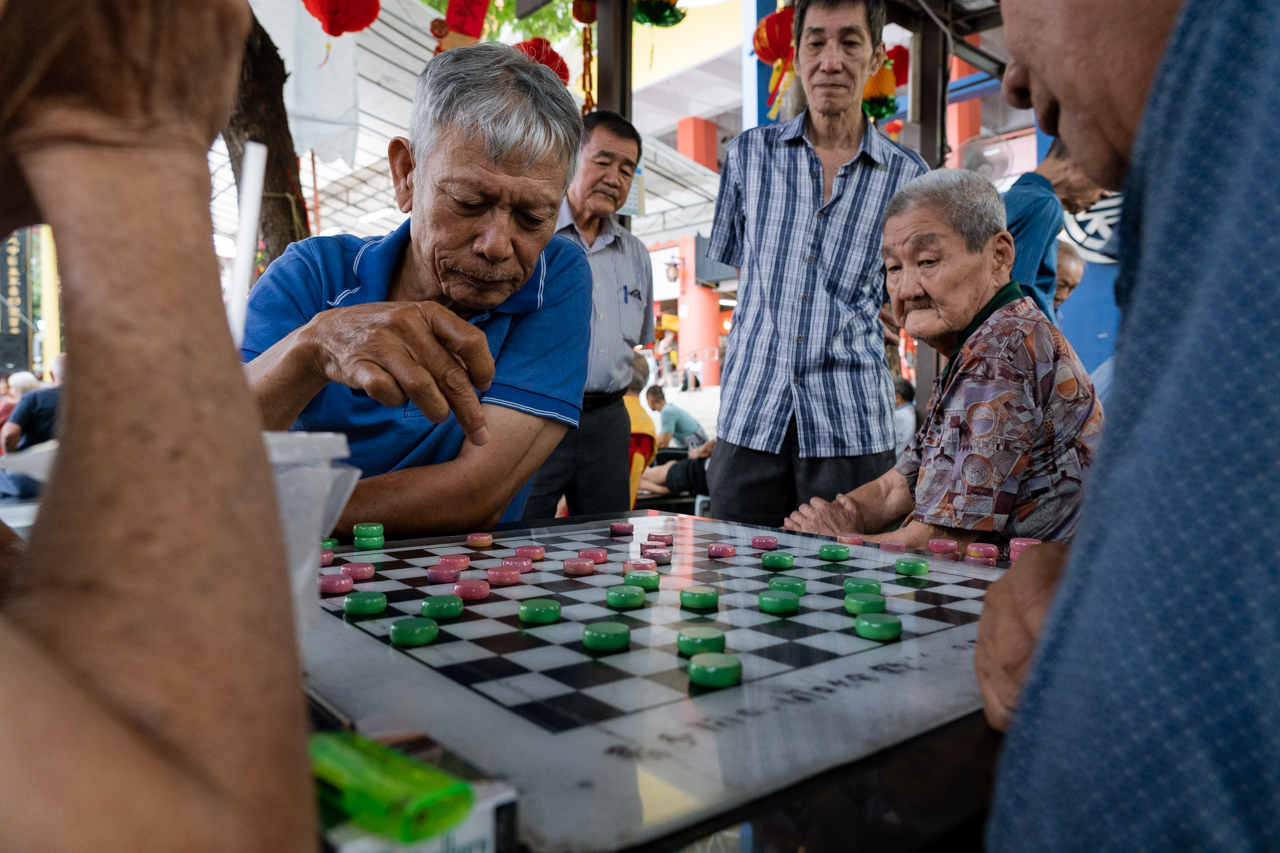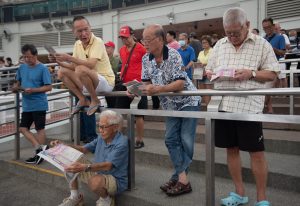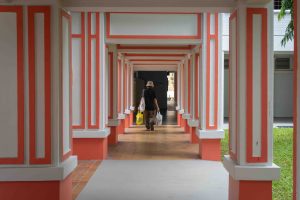In the middle of a quiet Chinatown, two men sit across from one another, a small crowd huddled around them.
The first looks to be around 60. Cigarette dangling from his discoloured lips, he studies the board in front of him, eyes darting between the numerous black squares. The older gentleman facing him does the same. Analysing the tiles as white as his beard, the man lets out a deep sigh as he ponders his next move.
The mood is tense; the crowd, hushed. Everyone staring at the checkerboard is lost in thought—including me. Unlike the rest, however, I don’t care about the outcome of the match. Nor am I bothered about the trap ol’ smoker just set for his opponent. What I’m really interested in is the small stack of $2 and $10 notes under a pack of cigarettes on the table.
Having observed these gentlemen on my multiple trips to the area, I knew that this wasn’t your average game of void deck chess or checkers. There were actual stakes here. More specifically, 20 bucks a game.
Which raises a couple of questions in my mind: weren’t these ah peks gambling in broad daylight and in full view of the public? Wasn’t that illegal and a textbook example of vice in the heartlands? Why was everyone so nonchalant about what was happening?
However. Judging from the way the two men interact, it’s clear they’ve known each other for a while. In fact, the longer I observe the strangers around me, it appears that they’re all friends in some way. Everyone knows everyone. This was a community of retired men bonding over a simple board game.
Hang on a second. Was the scene I was witnessing steeped in vice or virtue?
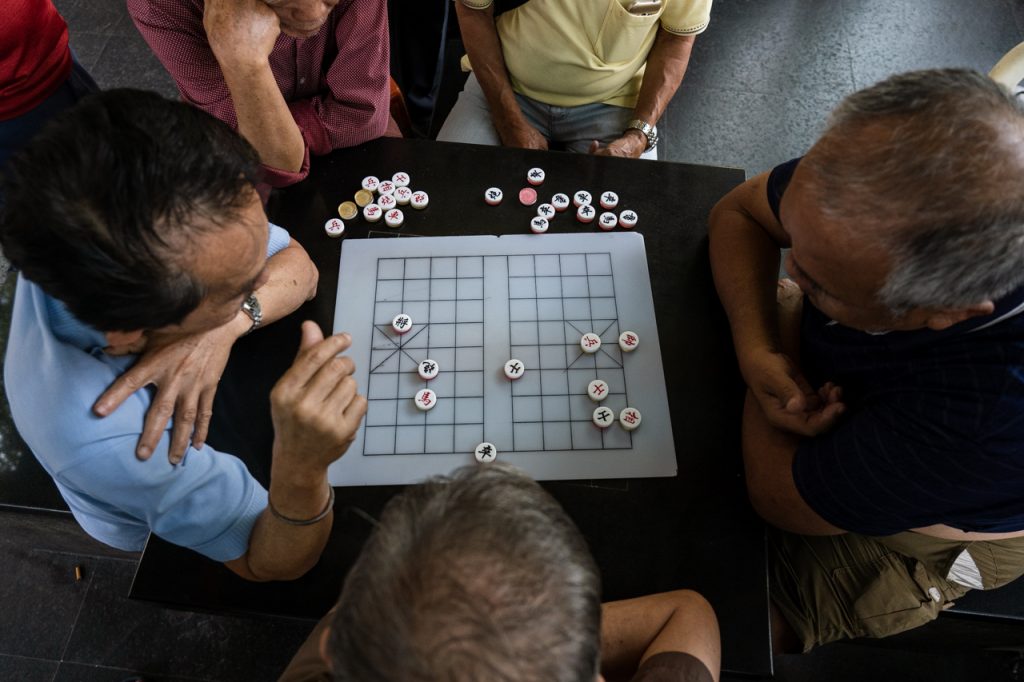
As a once-frequent visitor to the informal checkers and Chinese chess assemblies in Chinatown, Uncle Chong was introduced to the scene more than 40 years ago, when he was just 16.
“I didn’t study much la last time. I’d skip school quite often and one really cared! Come back in the middle of the night also can. So ya lor. Hang around the void decks near my house where my friends and I would always see this group of ah peks playing chess.”
Like most of us, Uncle Chong and his friends didn’t think much of what was happening since there was nothing unusual about bare-bodied uncles lazing under the block. Besides, free from the confines of the classroom, they were far too busy getting into all sorts of teenage mischief. But one day, casual indifference turned into genuine curiosity.
Short of a lighter for their cigarettes, Uncle Chong’s friends tasked him with borrowing one from the only group of people who probably wouldn’t give a shit about underaged boys smoking in their uniforms. Yup, who else besides those chess-playing octogenarians.
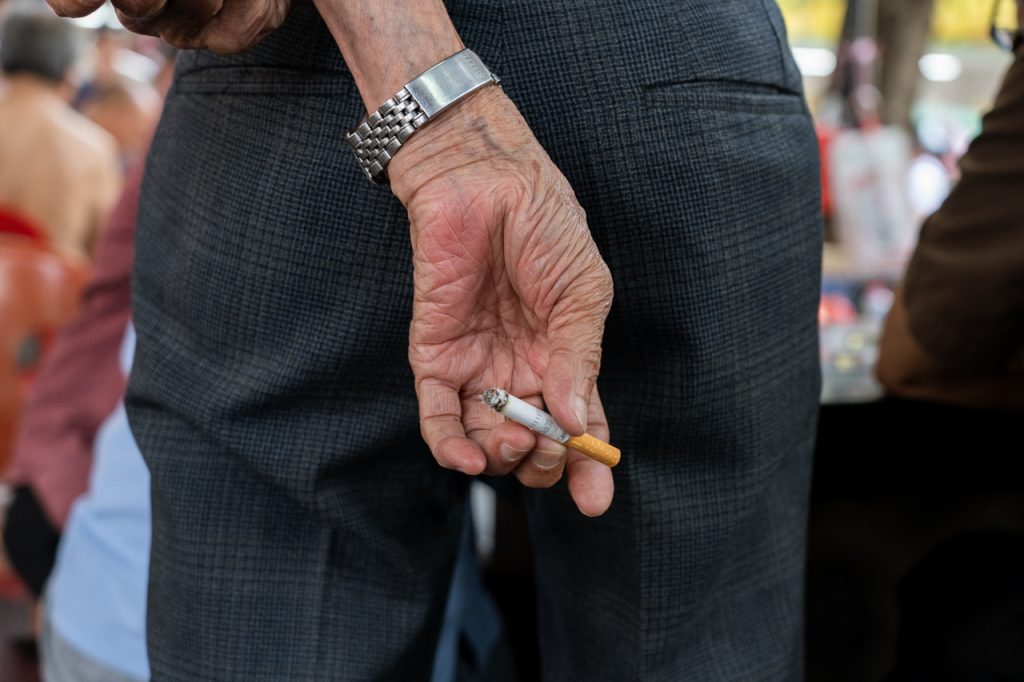
Dying to understand why and how these uncles could spend hours playing a board game, Uncle Chong came back the following day. And the next. And the one after that. He never dared to say anything though—he was much too fearful of breaking anyone’s concentration. So he kept to himself for weeks, all the way until he was addressed directly one afternoon.
“Once they were used to me hanging around, one of them said to me: ‘oi, young man, sit down la. Don’t need to play. I treat you free coffee. I cannot finish.’ That’s when I realised all the cups on the table were actually one guy’s winnings! These gamblers can and will bet anything one. Coffee. Cigarettes. Even lunch!”
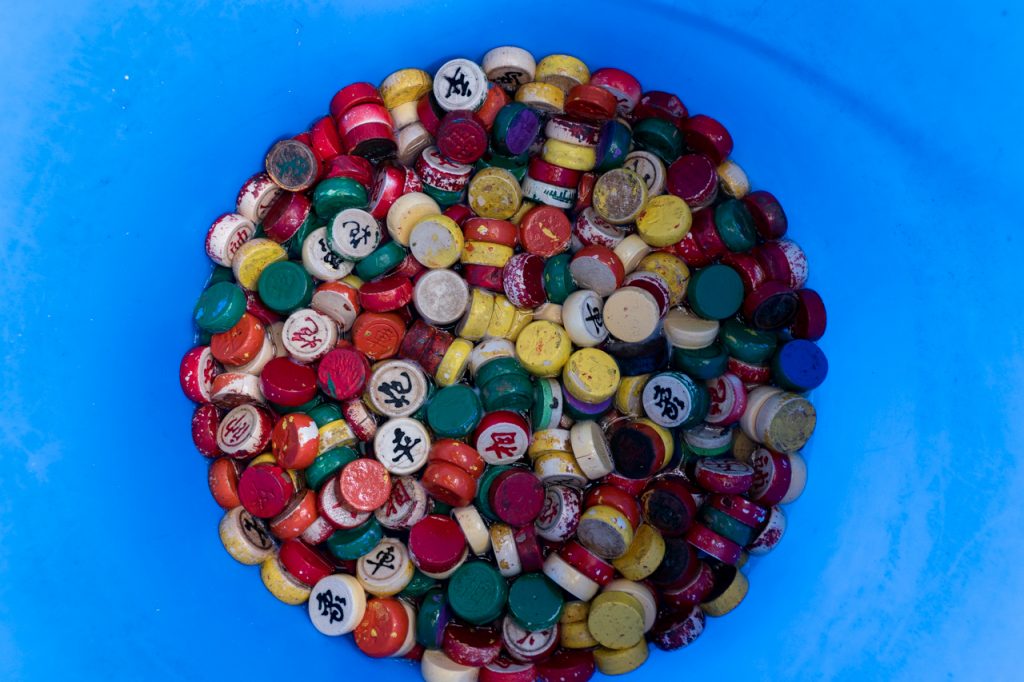
“I had opponents because they said I was reasonably good. You see ah, if you’re too lousy, they don’t want to play with you one. They want a challenge. Gambling also must have the kick what, right? Back then, there were guys nicknamed ‘大炮’[big cannon], ‘马将军’[horse general], and ‘棋王’ [chess king] because of how skilled they were at using certain pieces and the game in general.
What this meant was that the playing field wasn’t level. And this is key. Unlike forms of gambling completely reliant on luck/chance (Toto, 4D, slot machines) or those that are heavily dependent on someone else’s skill (football betting, horse-racing, etc), chess was a game—whose outcome they could themselves control—that these men repurposed.
This made the scene extremely enticing to anyone with a rudimentary understanding of Chinese chess. For older ah peks who already loved and enjoyed the game, there was always a new challenge(r) to conquer/outwit. On the flipside, newcomers could rest assured that the game wasn’t rigged. The biggest draw of all though? Money. If one was skilled enough, there is money to be made. Boy oh boy, is there money to be made.
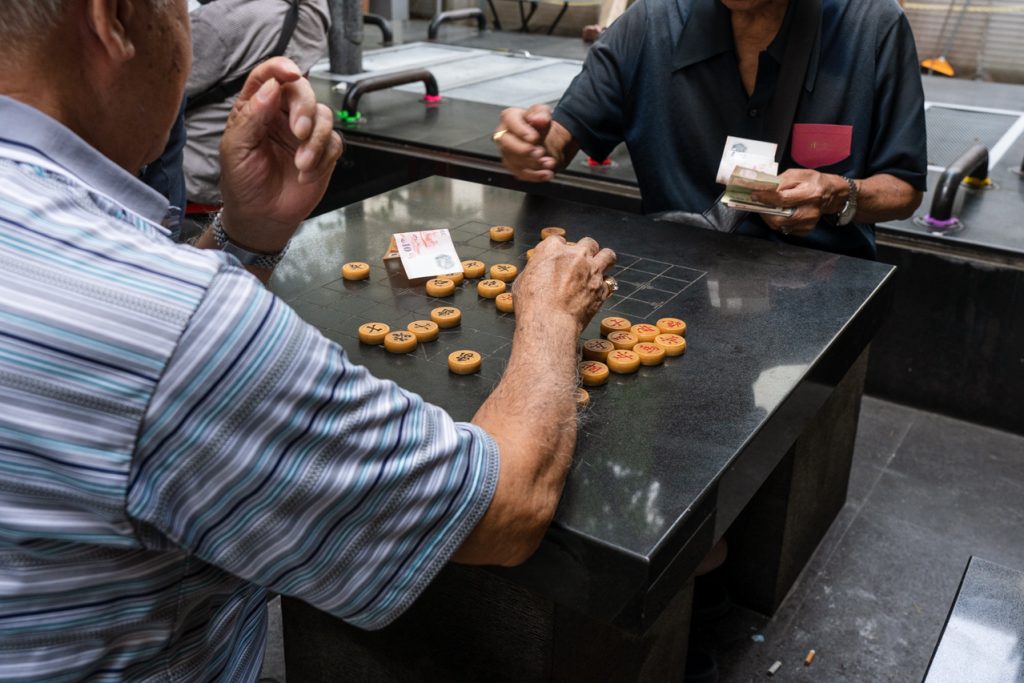
These curated matches were played tournament-style. Teams of 5 were carefully assembled with each member required to play a set of 3 games. Win your set and a thousand—yes, one thousand—dollars was yours to keep. Lose, however, and you’d best pray your teammates managed to save your ass/wallet. As soon as 3 members of either team win, the rest of the cash automatically goes to the winner and that’s it. Sayonara. Come back with actual skills, noobs.
There are rules, of course, but as you’d expect from the streets, they varied between areas and tournaments. For example, a chess clock was sometimes used to provide an additional challenge whilst also ensuring the game progressed faster. In other places, a handicap might be given, with certain chess pieces either given a premium or removed from the match entirely. Street rules, asshole. Abide by them or GTFO.
“That’s why you normally see so many people standing around. They’re trying to figure out how the betting works before they play,” Uncle Chong says.
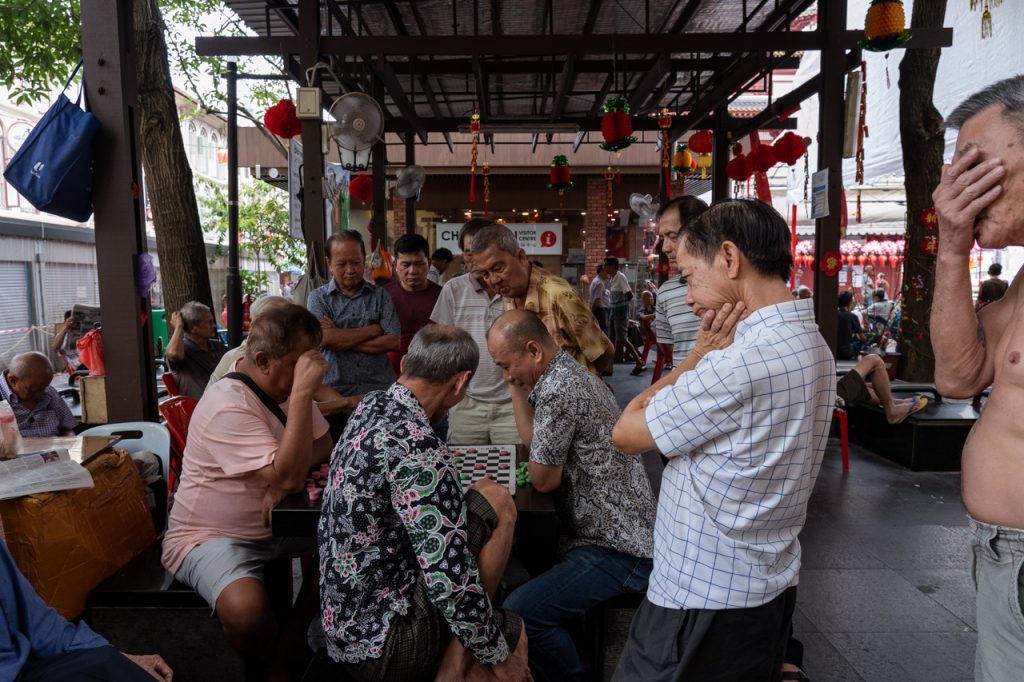
There’s one crucial criterion that has to be fulfilled before any deal goes down though. Both punters have to have a personal relationship with each other. After all, nobody’s going to take a bet if they can’t trust the other party to pay out when the odds weren’t in their favour.
Which brings us to the other side of the coin: the community.
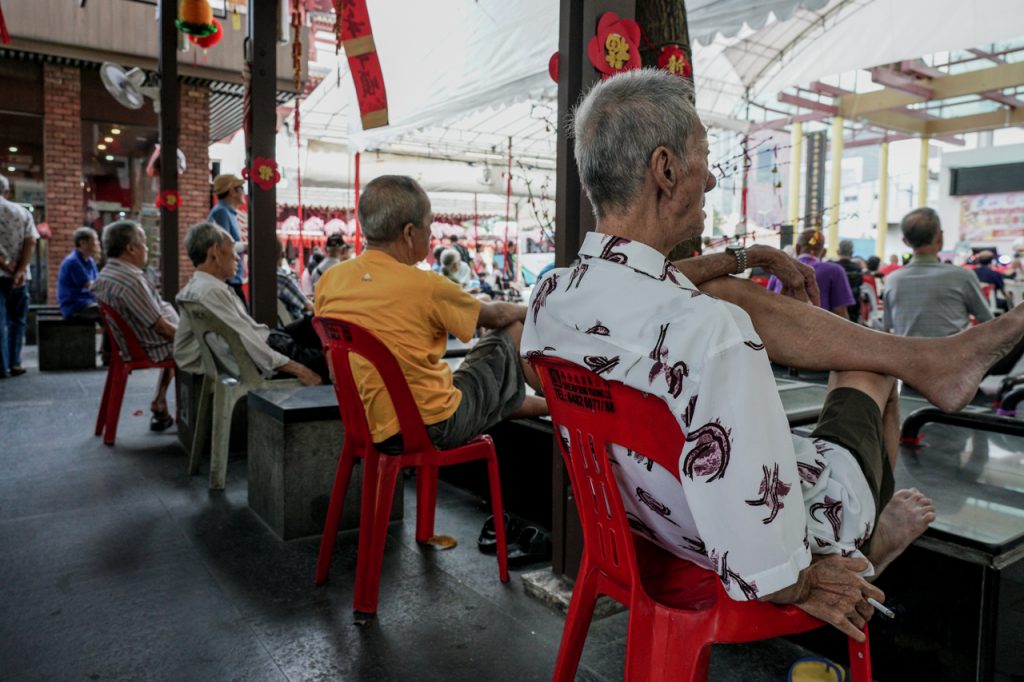
Having stumbled onto the Ang Mo Kio scene a few years ago, the newly-minted retiree figured that it would be an interesting way to pass the vast amount of free time he had recently been blessed while meeting new people.
Similar to Uncle Chong, Hock largely kept to himself for the first few months. Everyone seemed to know everyone and breaking into an already-established community is always tough, especially when they’re wary of newcomers, to begin with.
“Almost all of them live in the area and they agar [roughly] know who belongs and who doesn’t. They also know that what they’re doing can be considered illegal so if you’re a new face, they’ll be very quiet. Whether there’s money on the table or not also diam diam [keep quiet] one because they don’t know whether you’re an undercover police officer.”
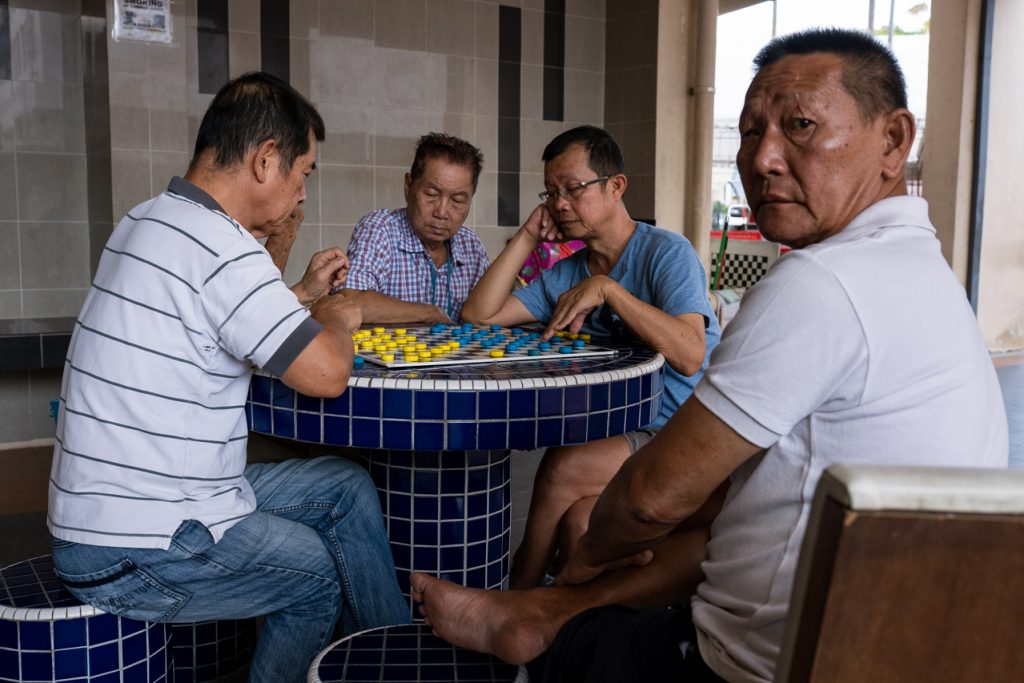
His first match was a friendly one. No money or betting of any kind was involved—just two old farts playing checkers and talking about life across the board. Up against a more skilled opponent, Hock naturally lost but it hardly mattered. What was important was that he was slowly becoming part of the community.
From that day on, no matter who he played, Hock made it a point to always look out for his very first opponent—a man who went by the name Ah Lee. Sometimes, they didn’t even play, content with chatting their afternoons away. The pair slowly became good friends and Ah Lee eventually introduced Hock to his other kakis, widening his social circle.
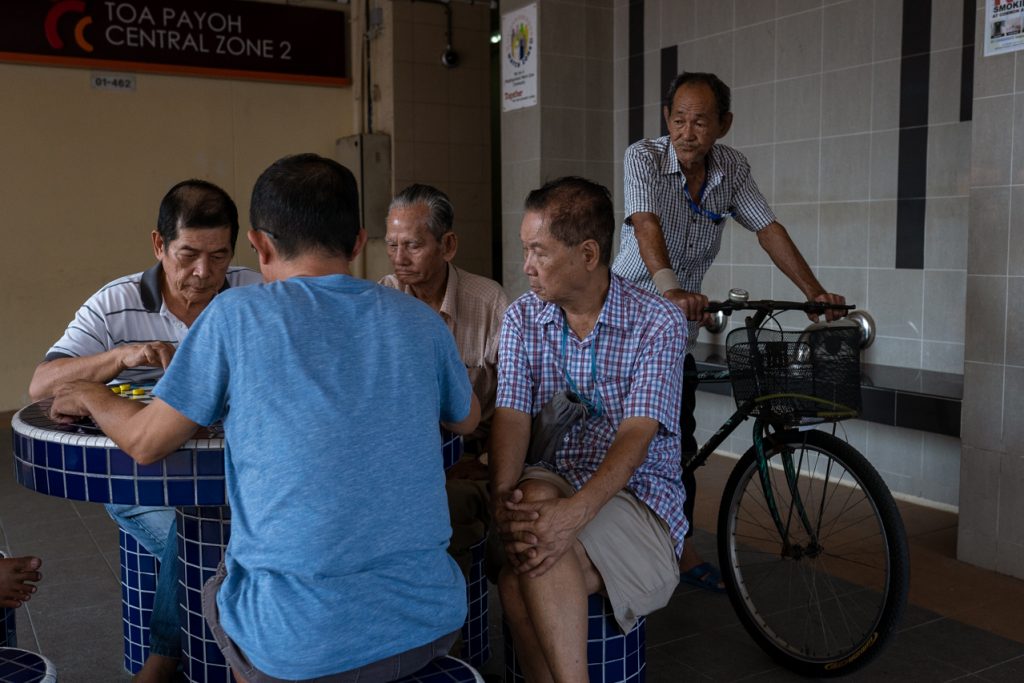
“Very honestly, betting does make things more interesting la. It’s a kind of excitement and it forces you to think harder about your moves. It’s not like we come here to make money. Anyway, $2 a game. How much can you earn? For fun only la!” he tells me.
To him then, playing checkers in public is a great way for seniors to pass the time, keep their minds sharp, and most importantly, feel less lonely. Yes, there might be a little cash involved but that only helps to attract new potential players to the community since they’re not private games (unlike say mah-jong at your friend’s place) and anyone can join. Everybody wins.
“As long as people don’t bet more than they can afford to lose, know when to stop and don’t think of this as some money-making scheme, I think it’s no big deal. Every day stay at home facing those four walls … can become senile one, you know!”
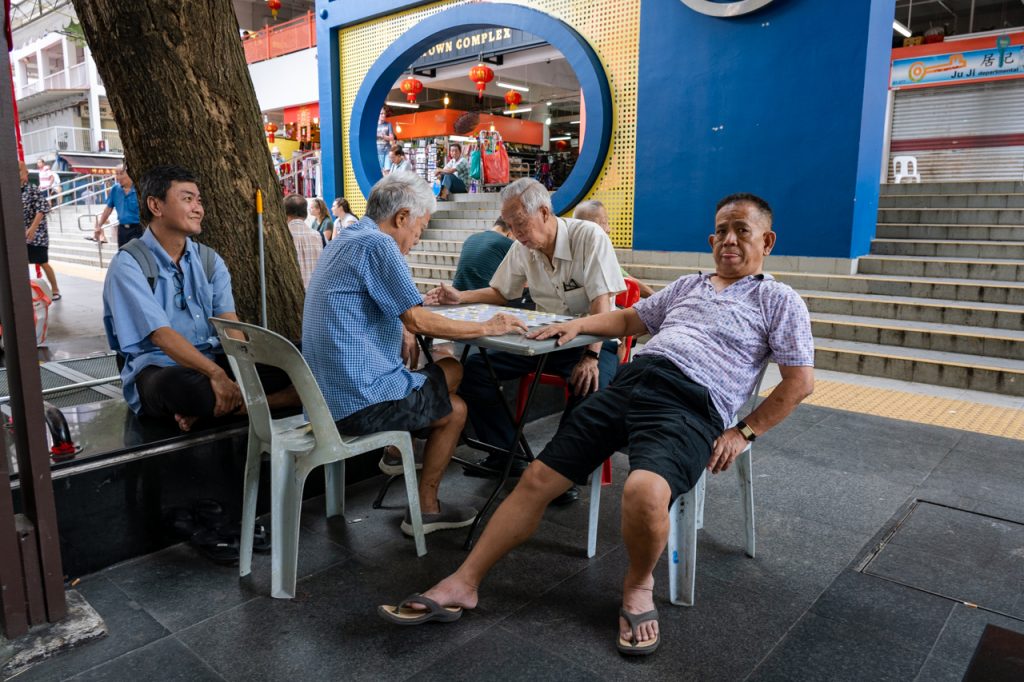
You see, there are 5 laws in Singapore that cover all aspects of gambling: the Common Gaming Houses Act (CGHA), the Betting Act (BA), the Private Lotteries Act (PLA), the Casino Control Act (CGA) and finally, the Remote Gambling Act (RGA).
Without boring you with too much legal jargon, the only statute that’s really relevant is the CGHA. And here are the terms you need to know:
‘Gaming’, refers to the playing of any game of chance or of mixed chance and skill for money or money’s worth of rewards and ‘Public place’ means any place to which the public has or may have access, including any estate, factory or place in which 10 or more persons are employed.
In other words, play checkers/ Chinese chess anywhere without betting = legal. It’s just a board game. However, play checkers/Chinese chess in public with any kind of bet (monetary or otherwise) = 1 X JIALAT SIA. Those convicted face a fine not exceeding $5,000 or imprisonment for a term not exceeding 6 months. Or you know, both, because why not.
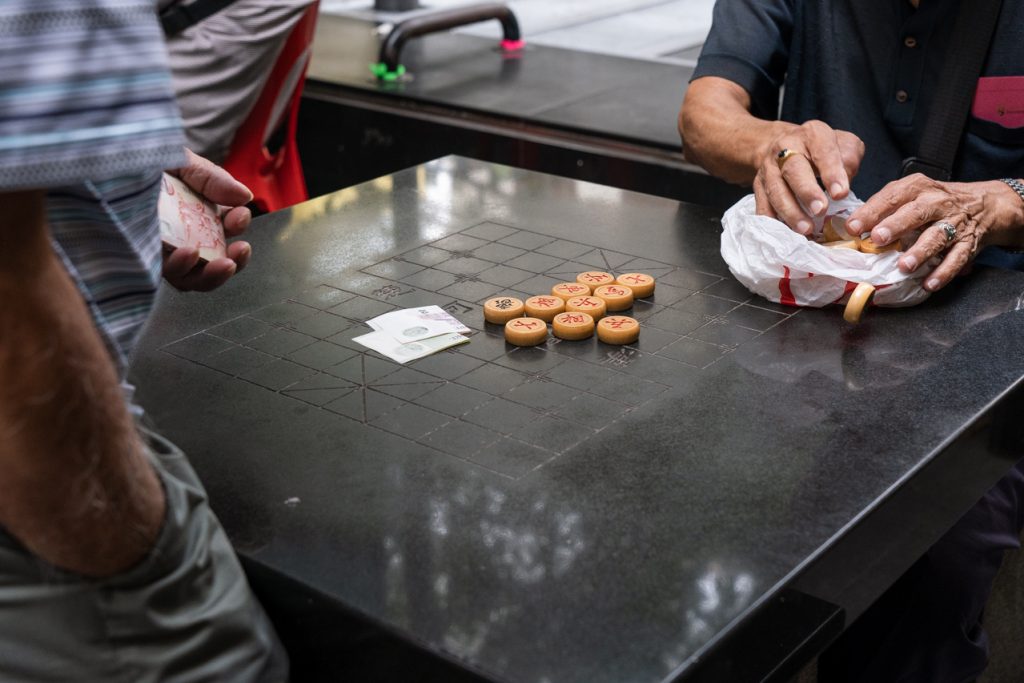
The numerous cups of coffee on the table? Maybe the uncle was just really thirsty that day. Cigarettes being passed back and forth? As long as they’re duty-paid, it’s nothing more than a bastardised version of pass the parcel. Even if money is seen changing hands, it’s exceedingly difficult to prove it was the direct result of a wager placed on the game of checkers/chess. Perhaps it was a previous debt for something completely unrelated to the game. Who really knows?
“Nowadays, those ah peks are very smart. They use their phones to record and track their wins and losses. They can even do bank transfers. Without solid proof, they’re just two old fogeys playing chess/checkers, no matter how strange the sight of a horde gathered around them is. Two men playing a board game just isn’t that interesting, you know what I mean?”
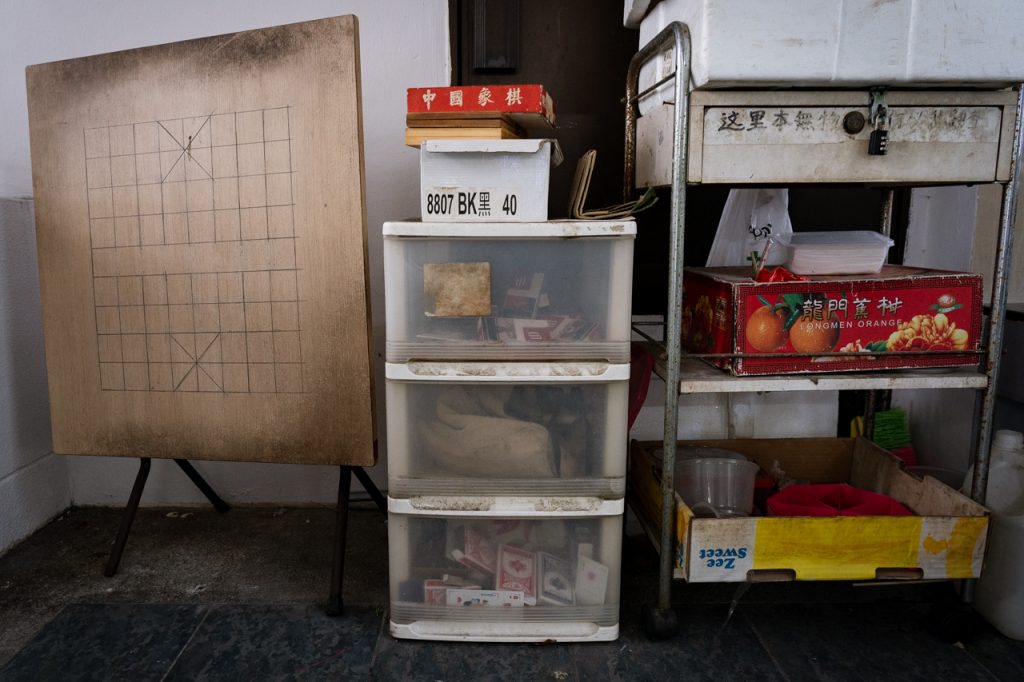
Oh, the differing and flexible rules of street chess do policemen no favours either. Sometimes, a pawn is worth $2. Others, $5. Likewise, a 10 cent coin on the table can also either be representative of $100 or something as innocuous as the leftover change from a cup of coffee depending on the day, location, and practically any other variable you can think of.
Now call me crazy but I’d like to think the police have better things to do than spend precious man-hours investigating the ever-changing intricacies of street checkers/chess. They probably also have bigger fish to try than ah peks burning through their CPF pay-outs.
But this isn’t to say that Mr Low condones what they’re doing. On the contrary, he tells me that in the eyes of the law, no matter how much plausible deniability these uncles use to their advantage, gambling is still illegal at the end of the day. In all his years in the police force, he’s never turned a blind eye to that.
But Mr Low does concede a small part of him gets why ah peks do what they do; he understands why they like to play checkers/Chinese chess in public and recognises the positives aspects of the scene.
Which is good enough for me.
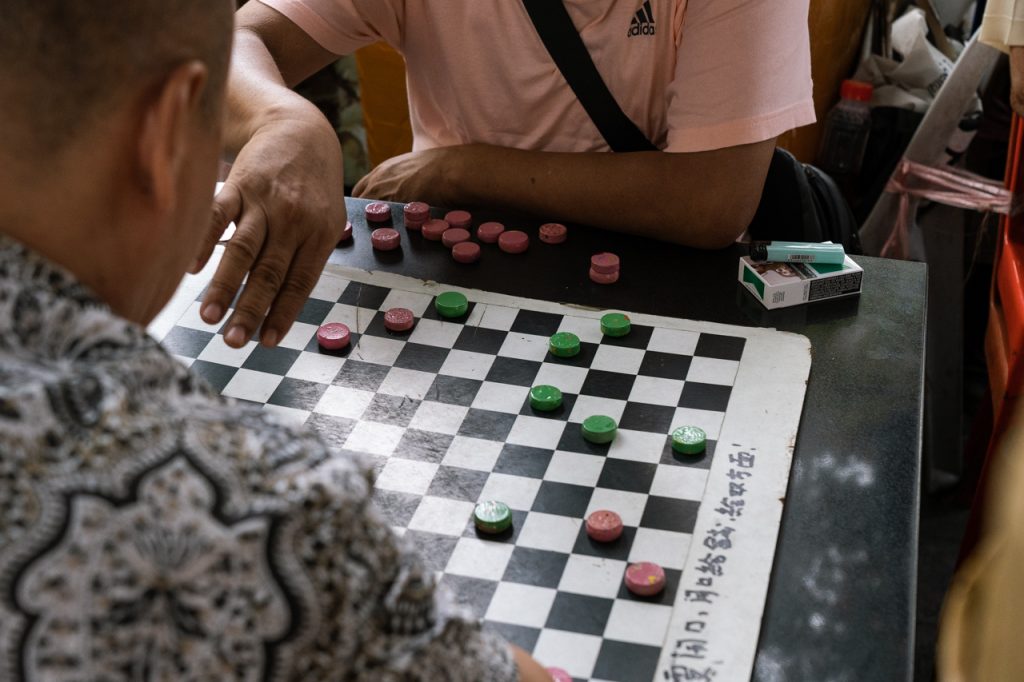
But I was horribly wrong. While there are definitely ah peks like that, most of them genuinely love the game and the challenge that comes with facing new and more skilled opponents. Remember: checkers and chess are games of skill rather than luck that were simply repurposed. They’ve built entire communities around these games, making new friends and keeping their minds active.
Money? Money just makes things that little bit more exciting. And hey, if you were pushing 70, you’d probably crave a bit of excitement in your life too.
So where does this leave us? What should you really think of these uncles who not only play, but bet on checkers/Chinese chess so brazenly in public?
Well, just like the checkered board the ah peks play on, whether the activity is steeped in vice or virtue depends entirely on your vantage point and what you’re focusing on. It can be black, it can be white. Or in the eyes of a regular bystander, a curious yet beautiful blend of both.
The perfect shade of grey in a world filled with colour.

